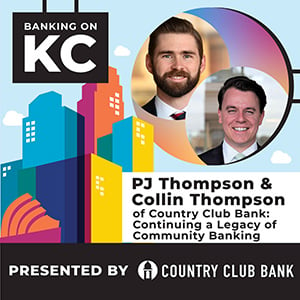The Bottom Line – Banking on Small Business

Banking On Small Business
Celebrating Kansas City's diverse and thriving family businesses
Kansas City is home to an incredible array of companies that began with an idea and have grown to include multiple generations. The breadth of Kansas City businesses is ever-emerging, from drugstores to data centers, manufacturers to wineries, and beyond.
We admire and celebrate these businesses, and we know firsthand how hard it can be. As a family-owned and operated business, Country Club Bank offers local businesses a partner with the same DNA—one with personal experience in the complexities, challenges and successes of business ownership and family relationships.
We are passionate about our fellow Kansas City businesses and share a language written in the entrepreneurial pursuit of excellence. Together, we strive for the highest levels of service, innovation, talent and product offerings. As many have proven over the years, excellence is not just about innate talent or grand gestures but rather the consistent execution of ordinary actions every day.
We know the long nights of an entrepreneur navigating a course through fluctuating economic environments. Country Club Bank has been forged in that same fire of experience and determination alongside other enduring Kansas City businesses. We are privileged to stand with them as a strong, practiced and understanding banking partner.
Our experience includes familiarity with the family dynamics of business ownership. Managing relationships in a family business is not always easy, but it is worth the effort. Like any dance, you occasionally step on each other‘s toes. And as in all good relationships—friends, family or business—you go back, apologize, express gratitude and commit to dancing on with increasing grace, appreciative of what a critical partner offers.
Compelling values—achievement, compassion, enthusiasm, integrity and teamwork—guide us here daily and keep us united in our mission. The bar is high. We strive to be examples of hard work and underscore our cultural values while putting overall gain above individual interests when necessary.
Just as on the gridiron, having the right team dynamic is critical to success — both in a family and a business. At Country Club Bank, we are blessed with building the most conscientious and capable team of associates — ready to provide superb service and financial expertise to family businesses in Kansas City — and reinforced by the resilient optimism of so many entrepreneurs who’ve gone before us.
Reminiscent of this determination is Jim Stowers, the late Kansas City businessman who received his initial loan from Country Club Bank. We join the legendary founder of American Century Investments in echoing his often-heard rallying cry, “The best is yet to come!”

— Mary O'Connor, Executive Vice President - Creative Brand Management, Country Club Bank — Member FDIC
Economic Insights
Inflation recedes, markets applaud, and Costco gold sales go through the roof
U.S. inflation saw a modest decrease in April, providing some respite to investors and the Federal Reserve after early-year data highlighted ongoing price pressures.
The consumer price index (CPI), which tracks the cost of goods and services across the U.S. economy, increased by 3.4% year-over-year in April, according to the Labor Department's most recent report earlier this month. Core prices, which exclude the more volatile food and energy sectors, rose 3.6% annually, marking the smallest increase since April 2021.
This report, aligning with market expectations, was welcomed by investors following three months of higher-than-expected inflation.
While the inflation report was positive, there still needs to be more evidence for the Federal Reserve to consider lowering interest rates anytime soon. Until there is a clear and consistent movement towards lower sustained inflation, the prevailing opinion across markets is that we can likely expect interest rates to stay where they are for some time.
So, what’s keeping inflation and spending elevated? The demand for data centers is one hot spot (driven by AI or artificial intelligence). Market analysts estimate up to $1 trillion in data center upgrades will occur in the coming years, which could require as much as 500 thousand to 1 million tons of copper through 2027 (with the need for copper in EV batteries another large driver this decade).
The demand for gold has also risen sharply, driving it to new recent highs. For proof of this latest development, you need look no further than retail innovator Costco, which sells $100 million to $200 million in gold bars per month. These are just two minor examples of too many dollars chasing too few goods, which is the primary driver of inflation at the most fundamental level.
Bottom Line: April inflation readings indicate that price pressures have not accelerated, providing further reassurances the Federal Reserve likely won't need to raise rates again.
And while the Fed's next move is more likely to be a rate cut rather than an increase, cutting rates this year is still in question if inflation decreases less than anticipated.
Fed officials are balancing two risks: easing too soon, which could boost spending and investment and prevent inflation from returning to the 2% target, and waiting too long to see the effects of tighter policy on labor markets, which could necessitate a series of traditional rate cuts often associated with economic downturns.
While the U.S. economy faces several headwinds regarding global economic volatility, the domestic markets still show remarkable resilience and strength. With the expectation of moderated growth, the forecast for real GDP growth in 2024 still hovers around 2.1% per the most recent Federal Reserve forecast (down slightly from 2.5% in 2023), indicating a more cautious expansion than last year, but an expansion nonetheless, which is critical to staying out of recessionary conditions. This outlook is optimistic but still cautious as the balancing act between managing inflation, navigating higher interest rates and fostering sustainable economic growth continues challenging the Fed and capital markets.

— Marcus Scott, CFA, CFP®, Chief Investment Officer (CIO) for Country Club Trust Company
CFA® and Chartered Financial Analyst® are registered trademarks owned by CFA Institute.
Certified Financial Planner Board of Standards Inc. (CFP Board) owns the certification marks CFP®, CERTIFIED FINANCIAL PLANNER™, CFP® (with plaque design), and CFP® (with flame design) in the U.S., which it authorizes use of by individuals who successfully complete CFP Board's initial and ongoing certification requirements.
The opinions and views expressed herein are those of the author and do not necessarily reflect those of Country Club Trust Company, a division of Country Club Bank, or any affiliate thereof. Information provided is for illustrative and discussion purposes only; should not be considered a recommendation; and is subject to change. Some information provided above may be obtained from outside sources believed to be reliable, but no representation is made as to its accuracy or completeness. Please note that investments involve risk, and that past performance does not guarantee future results.
Client Success Story
McAnany Construction paves the way for third-generation family leadership and new growth, with operating capital from Country Club Bank
 Ben McAnany has come a long way since his first $16.50 paycheck earned 20 years ago washing construction equipment at McAnany Construction. Always fascinated by the family business run by his father, Pat, and his uncles, little did Ben know he might someday be responsible for charting its future in its 70th year in business.
Ben McAnany has come a long way since his first $16.50 paycheck earned 20 years ago washing construction equipment at McAnany Construction. Always fascinated by the family business run by his father, Pat, and his uncles, little did Ben know he might someday be responsible for charting its future in its 70th year in business.
Ben, a third-generation co-owner along with his cousin Eric Vossman, began his leadership journey only 10 years ago, but the company has been paving and maintaining roads and parking lots across the Kansas City metro area since its founding by Ben’s grandfather, Richard, and his brother John McAnany in 1954.
“We’re grateful for this opportunity and want to make the most of it for ourselves and the families of those that work here,” said Ben. “We’re very hands-on, with Eric’s background in architecture and my background on the sales and financial side, we make good partners, and it’s been great to continue the family business together.”
Over the decades, McAnany Construction has not only survived but thrived, weathering business transitions and economic fluctuations. With a constant need for new equipment and supplies, a strong partnership with Country Club Bank has ensured capital availability through various stages of growth and transformation.
 One of the most valuable benefits of the partnership has been the flexible credit line provided by Country Club Bank. The revolving line of credit has been crucial for managing cash flow, especially with large projects that require significant upfront investment.
One of the most valuable benefits of the partnership has been the flexible credit line provided by Country Club Bank. The revolving line of credit has been crucial for managing cash flow, especially with large projects that require significant upfront investment.
"We might be getting five million from a customer but need to pay out two million immediately," Ben said. “The ability to access funds quickly has eased operational pressures and allowed us to make faster decisions and focus on growth.”
Systems and facilities have also been upgraded to meet modern safety, security and productivity standards.
"Our financial and operational software systems have been upgraded, and we’re also updating offices and other physical plant assets," Ben said. “Country Club Bank has played a large part in funding these projects.”
Over the past decade, McAnany Construction has grown from 45 employees and $30 million in revenue to 134 employees and an expected $85 million in revenue this year.
According to Ben, this growth has been organic and driven by the trust and faith placed in their employees.
"We have a saying around here,” said Ben. “People don’t work for us; they work with us. Everyone at every level is important, and we want to recognize that and reward it daily.”
Ben said the relationship with Country Club Bank is built on the same principles of humility, honesty and hard work.
“They are very much a bank of faith, trust and teamwork,” said Ben. “They tell you what’s possible, figure out what’s best for all stakeholders and do everything they can to make that happen.”
Capital Access Insights
Navigating Small Business Capital
Understanding the nuances of bank loans can lead to financing solutions that enhance your business’s growth and sustainability.
 Capital is essential for small businesses, driving everything from daily operations to ambitious long-term growth initiatives. Small businesses often need capital to expand their physical or online presence to meet customer demand, smooth out cash flow during seasonal peaks and valleys and upgrade technology to improve productivity and competitiveness.
Capital is essential for small businesses, driving everything from daily operations to ambitious long-term growth initiatives. Small businesses often need capital to expand their physical or online presence to meet customer demand, smooth out cash flow during seasonal peaks and valleys and upgrade technology to improve productivity and competitiveness.
Although some businesses prefer to grow organically, free of debt, achieving next-level growth often requires outside funding. There are myriad external sources of funding for small businesses, and they are categorized into two broad buckets: debt financing (money provided by a lender that must be repaid with interest) and equity financing (selling ownership shares of your business to investors in exchange for capital). Bank loans are a form of debt financing.
Let’s explore the various types of small business bank loans available and how to leverage them to benefit your business.
Four Types of Small Business Capital
1. Traditional Term Loans
Term loans provide businesses with a lump sum of money with a fixed interest rate and a repayment schedule. They are often used to fund significant one-time investments that require more than a one-year repayment period. Whether you're planning to open a new storefront, expand your existing operations or introduce a new product line, term loans can provide the necessary capital to fuel major growth.
For instance, the owner of a local retailer may apply for a commercial real estate loan to purchase a larger, more central location, potentially transforming the customer experience and increasing foot traffic. Similarly, a small manufacturer might opt for a business expansion loan to scale up production or break into new markets.
Obtaining a term loan involves demonstrating your business’s capacity for repayment and strategic growth potential. Successful applicants usually have a strong credit history, substantial business experience and demonstrated profitability. Required documentation often includes detailed financial statements, a comprehensive business plan and personal guarantees.
2. Lines of Credit
Revolving lines of credit are used for short-term cash-flow needs. Businesses can borrow against them when needed, up to an established limit, and pay interest only on the amount borrowed. This makes them useful for managing cash flow fluctuations caused by inventory purchases, increases in revenue and unexpected increases in expenses that must be covered.
Revolving credit lines are similar to a credit card but tailored to meet the short-term cash-flow needs of the business. Short-term cash-flow needs could be caused by seasonal business conditions, supply chain disruption, new business mobilization or ramp-up expense, increased periods of sales or volume or delayed customer payments, among others. This type of credit facility allows businesses to have access to funds, repaying the borrowed money and reborrowing against the line again all for short-term cash flow needs.
Consider a landscaping business that experiences peak seasons during the spring and fall. A line of credit allows them to hire additional staff and purchase materials in advance, preparing for the busy months before revenue is collected.
Lines of credit require a good credit history, management systems and financial stability. Proof of ongoing business operations is also crucial. Documentation could include historical financial statements, current accounts receivable and account payable aging reports, revenue concentration reports and cash flow forecasts
3. SBA Loans
SBA loans are guaranteed by the U.S. Small Business Administration (SBA) to assist businesses that may not meet collateral requirements for traditional bank loans. They generally offer more flexible terms than most conventional loans and often have lower down payments too.
Two of the more popular SBA loan programs are the 7(a) loan program and the 504 loan program. The 7(a) loan program offers up to $5 million for various business purposes ranging from working capital to debt refinancing. The 504 loan program provides long-term, fixed-rate financing for major assets such as buildings and equipment.
A local restaurant might consider a 7(a) loan to finance an expansion that covers everything from leasing additional space to buying equipment and furniture. A small tech firm could use a 504 loan to invest in costly, state-of-the-art servers and hardware.
To qualify for an SBA loan, businesses must meet SBA size standards, demonstrate an ability to repay and show they are an ongoing for-profit business. The application process can be stringent, often requiring detailed financial records, business plans and personal financial details.
4. Equipment Financing
Equipment loans are tailored for the purchase of new or used equipment, with the equipment often used as collateral for the loan. This type of financing is advantageous because it allows businesses to acquire essential equipment without tying up working capital.
There are two main types of equipment financing: leasing programs and direct equipment loans. In a leasing situation, a third party owns the equipment that the bank finances and the business leases the equipment from that third party. In a direct loan scenario, the loan finances the purchase of office technology, machinery or vehicles directly with the user.
A dental office may take advantage of equipment financing to purchase the latest dental technology, enhancing patient care and operational efficiency. A leasing program might be the right solution for a transportation company looking to free up capital while retaining the use of its fleet.
Eligibility for these loans generally requires a quote for the equipment, a down payment and a good business case for how the equipment will improve operations. Like other loans, financial statements, credit history and the health of the business are considered.
The Community Bank Advantage
As Kansas City’s premier community bank, Country Club Bank is more than just a lender. Yes, we are committed to serving as a trusted financier, but we also desire to be a reliable partner in the economic development of local businesses like yours.
First and foremost, we are invested in your success. We pride ourselves on fostering personal relationships that provide us with a deep understanding of you, your business and your industry. Because we know that finding the right type of capital can redefine your business trajectory, our team is committed to providing guidance and financing solutions that align with your unique needs at each stage of your business’s development.
As a family-owned Kansas City financial institution, Country Club Bank understands the local economic landscape, enabling us to offer personalized service and insights that larger national banks simply cannot match. When you work with Country Club Bank for your lending needs, you work with commercial lenders based in Kansas City—and all lending decisions are made locally. Our success is reflected in the thriving local businesses we support across Kansas City.
If you would like to discuss the financing solutions that can help take your business to the next level, give us a call.
Banking on KC Podcast
On continuing a legacy of community banking at Country Club Bank with PJ Thompson and Collin Thompson
PJ Thompson and Collin Thompson delve into the crucial role of community banking in driving local economic growth. They also share the core values that have enabled Country Club Bank to maintain strong community relationships across multiple generations. Join them as they explore how these principles continue supporting and uplifting the bank and positively impacting the local economy. Listen to this fascinating podcast now.

Newsletter Sign-Up